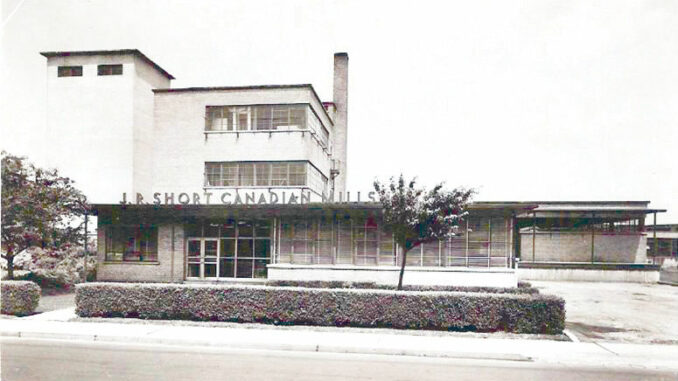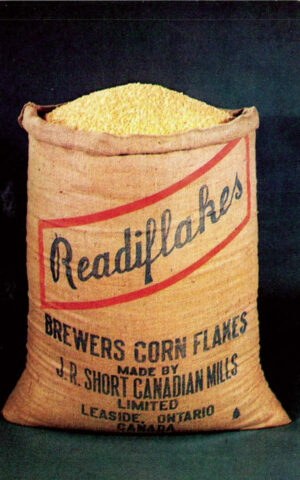
On the north side of Wicksteed Ave., between Laird and Brentcliffe, is a vacant, waterlogged construction site known to many residents as “Lake Leaside.” The site has been undeveloped for many years, but it was once occupied by one of Leaside’s most durable businesses.
Origins and operation
The company was J.R. Short Canadian Mills Ltd., a subsidiary of J.R. Short Milling Inc. – a Chicago-based company specializing in grinding and processing corn for the food and beer industries. As WWII ended, the U.S. firm expanded into Canada – erecting a research and milling facility, plus a warehouse, at 70 Wicksteed. The architect was the renowned Gordon Adamson, designer of the stately Divadale mansion near Sunnybrook Park.

According to the Biographical Dictionary of Architects in Canada, Adamson and his firm were leading proponents of “modernism” in Canadian architecture. Adamson had earlier designed the (since demolished) Crothers Manufacturing showroom on Laird and Millwood, now the site of the Redway Loblaws. He also designed Leaside Memorial Community Gardens and the earlier Leaside Library on McRae Drive.
As the Wicksteed building was being constructed in 1945-46, Jeffrey Short Jr., son of the company’s president, moved to Toronto from Chicago and began aggressively recruiting staff to run the fledgling operation. Short stayed in Toronto until 1952, returning home to manage the U.S. business. (He would later gain recognition as a respected environmentalist.) Following Short’s departure, the Leaside plant was supervised for the next 20 years by company vice-president William Wright of 71 Cameron Cresc.
From the late 1940s to the start of this century, the company developed and manufactured grain-based products for domestic and foreign markets – including brewers’ corn flakes, dough whiteners and sausage binders. It was a good corporate citizen, contributing to the Hurricane Hazel relief fund in 1954. The company was also a member of the Bakery Council of Canada and a longstanding member of the Canadian Alliance of Manufacturers and Exporters.
The firm generally kept a low profile and was rarely mentioned in newspapers – with one major exception. On Sept. 10, 1979, a young, newly hired employee fell into a grain-filled railway car as it was being unloaded and suffocated to death. The tragedy prompted an inquest, which recommended improved safety measures at the plant.
Demise
In fall/winter 2005, the Leaside Business Park Newsletter reported that the J.R. Short plant had been sold. Soon after, the building was abandoned and became a popular destination for urban explorers, several of whom posted online photographs of its interior and exterior [https://www.uer.ca/locations/show.asp?locid=23896]. The pictures reveal a sad story of neglect and decay of a once vibrant enterprise.
In 2006/2007, the modernist building was demolished. Within a few years the REIT, SmartCentres, submitted a controversial proposal to develop the site, resulting in the formation of “Lake Leaside.”
While the site still remains undeveloped, it is hoped that whatever is built there in the future at least equals in aesthetics and longevity the magnificent J.R. Short Canadian Mills Ltd. edifice.


